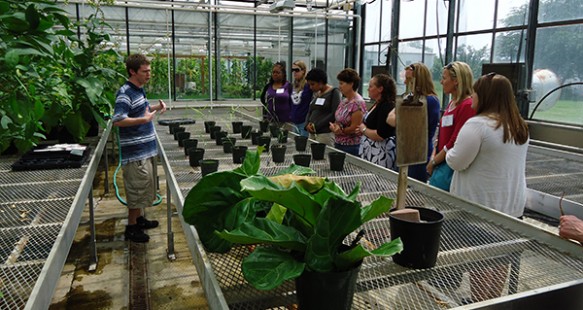
Eight Delaware high school teachers were provided a focused training in bioenergy and bioproducts through a special educational program held last month at the Delaware Biotechnology Institute (DBI).
The program is a new initiative that builds upon an existing partnership involving Cornell University, Delaware State University (DSU) and DBI to educate teachers about alternative energy technologies and foster student interest in science, technology, engineering and mathematics (STEM) careers.
The project leverages curriculum materials that were developed through the Bioenergy and Bioproducts Education Program (BBEP), which provides professional development opportunities and support for (STEM) educators nationwide.
The mid-June program hosted by DBI focused on showing teachers how to use the curriculum effectively. It covered a broad range of topics including sustainability, systems thinking, biomass feedstocks, liquid biofuels (ethanol, biodiesel), bioheat, biopower, bioproducts, and public policy on bioenergy and bioproducts.
The agenda included field trips to the University of Delaware’s Fischer Greenhouse and Colburn Laboratory and to the DuPont Experimental Station, as well as hands-on activities to help participants understand how to translate the information learned during the program into the classroom.
“We incorporated a variety of activities, including content lectures, guest lectures, field trips and hands-on science activities to keep the delivery interesting and fun,” said Diane Wuest, a BBEP master teacher and doctoral candidate in chemical and biomolecular engineering at UD, who led the program. “We performed a few of the science activities during the workshop to familiarize the teachers with how they can be run in the classroom, and each activity provides the teacher with expansion ideas to make the objectives more challenging.”
Wuest said the program takes an integrated approach to studying all aspects of bioenergy and bioproduct production so that teachers can inform their students about the different technologies and job opportunities along the way.
“For example, we performed hands-on activities to study bioethanol production from experimenting with biomass seed germination rates to biomass feedstock glucose levels,” she said. “We also ran through a role-play activity with the educators to teach about the important social, economic, and environmental considerations for biofuel production.”
Teachers were provided with the complete BBEP curriculum, as well as biomass to biofuel kits, seed germination supplies and other related materials.
Teachers who participated in the program were: Bonnie Wilson of Brandywine High School, Brandy Short of Concord High School, Lisa Tice of Smyrna High School, Lyndsey Fisher of Conrad Schools of Science, Mia Primas of Christiana High School, Nancy Guy of Brandywine high School, Samantha Neubert of Appoquinimink High School and Stephanie Matson of Thomas McKean High School.
While the DBI program focused on high school teachers in the New Castle County area, DSU hosted a BBEP teacher training program in mid-July for teachers in Kent and Sussex counties.
BBEP is supported by a large-scale multi-institutional grant from the U.S. Department of Agriculture’s Agriculture and Food Research Initiative project led by Cornell University and DBI’s participation was supported by a grant from the Delaware Department of Natural Resources and Environmental Control.

Delaware high school teachers toured facilities at UD and DuPont.